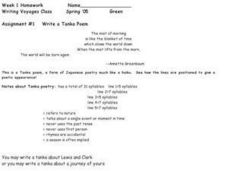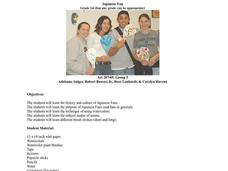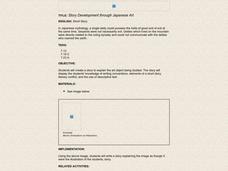Curated OER
Koi Pond
Create this beautiful koi pond scene using watercolor paper, crayons, and paints. This would be a fantastic project to link to a scientific study of pond life or a historical study of Japanese culture.
Curated OER
Feudal Japan
An excellent overview of historical Japanese culture, this presentation could carry through a world history unit or a lesson on the history of Japan. Especially interesting are the slides that compare Japanese armor and castles to other...
Curated OER
The Geography of Japan
A comprehensive look at Japan and its characteristics will engage and inform the viewer about one of the most prominent powers in the world today. The demographics, topography, and climate of Japan are covered in these slides with maps,...
Curated OER
Shizuko’s Daughter: Knowledge Rating Scale
How well do your kids know key terms from Shizuko's Daughter by Kyoko Mori? Have them review a list of words that they will encounter in the novel, and mark which words they know well, which words they've seen before, and which words...
Curated OER
Shizuko’s Daughter: K-W-L
What would your class like to learn about Japanese culture? Prepare them for a novel unit about Kyoko Mori's Shizuko's Daughter with a KWL chart. After listing what they already know about Japanese culture, they write questions about...
Curated OER
Shizuko’s Daughter: Before, During, After Lesson Plan
Shizuko's Daughter by Kyoko Mori presents a vivid picture of Japanese culture and history. As kids read through the third chapter, they find novel-specific vocabulary to enhance their understanding and use context clues to determine...
Curated OER
Lesson: Soapin' It Up
A Japanese Shinto deity from the early 900s inspires youngsters to think symbolically. They analyze the carved sculpture, the techniques used to create it, and its cultural or symbolic meaning. Then, they design and carve a symbolic...
Curated OER
Write a Tanka Poem
In this Tanka poem worksheet, 6th graders analyze a Tanka poem for number of syllables and content parameters, then write one about a journey, real or imagined using the 6 step writing process.
Alabama Learning Exchange
Origami Geometry
Origami is an excellent way to combine Japanese culture, art, and geometric shapes into one engaging instructional activity! Scholars begin by listening to the story Sadako and the Thousand Paper Cranes and learn the origin of the...
Curated OER
Japanese Fan
First graders learn about the traditional purpose of Japanese fans. They practice using two new brush strokes as they create nature-inspired fans, similar to those seen in Japan. A web link and basic background information is included.
Curated OER
Story Development through Japanese art
A classic Japanese print is attached to this lesson and its up to your class to write a story about it. Pretending the image is an illustration, they use what they know about Japanese mythology to compose a short story describing the...
Curated OER
Japanese Music Study
Gagaku is music traditionally played in the Japanese imperial courts of long ago. Learners listen to this and other traditional Japanese music to gain an understanding of culture and music history. They work to identify Japanese...
Curated OER
Japan
Introduce your class to the beauty, population, architecture, and special places of Japan. They'll learn about the currency, the weather, and how Japan is different or similar to New Zealand. Note: While this presentation makes...
Curated OER
The Paper Dress - Circa 1968
You won't believe your eyes when you see these dresses made out of paper. Students create paper dresses by modifying a pattern provided by the teacher, and decorate the dress using 1960's style art. What a fantastic and motivating...
Curated OER
What is a Haiku? How Do You Write a Haiku?
Haiku poetry is explored in this language arts lesson. Yong readers identify the characteristics of haiku and read several examples. Students make connections between their study of Japan and the poetic form of haiku, and they write...
Curated OER
Setsubun:Keeping Away Evil in Japan
Students will be exposed to and come to understand Japanese culture through a presentation on Setsubun. They then become familiar with Japanese words that are related to Setsubun.
Curated OER
Shintoism
Take a trip to Japan in this bright and vivid presentation that displays the philosophies and traditions of Shintoism. Pictures of temples, shrines, and theater productions will enthrall your class and bring their study of world...
Curated OER
Natural Disasters
Students read the book "Tsunami!" and discuss natural disasters and how they can prepare. This instructional activity is much more than a study of tsunamis. The instructional activity is chock-full of ways to study the Japanese culture...
Curated OER
Noh Theater
Students take a closer look at Japanese drama. In this Japanese culture lesson plan, students study the attributes of Noh theater and compare it western theater. Students conduct independent research on the art form prior to acting out a...
Curated OER
Foods and Languages of the World
Learners explore cultures around the world. In this cross-curriculum geography lesson, students listen to This is the Way We Go to School , a Book about Children around the World , and locate various countries on the globe and a map....
Curated OER
Japan
For this crossword puzzle worksheet, students will use terms and knowledge about the country of Japan. Students will fill in the puzzle of 14 questions according to the words about the country and its culture.
Curated OER
Gyotaku Lesson Plan
Students study the Japanese art of fish painting called Gyotaku while examining the lifestyle of Japanese fishermen at the end of the Edo period. They make a Gyotaku fish print and write a haiku poem using the proper number of syllables...
Curated OER
Women in Society
Students survey similarities and differences in the role of women in Japanese and American culture and how these roles have changed over time. They predict what roles for women in Japan might have in the future and identify the...
Curated OER
A Visit to Japan
Studnets complete a variety of activities as they develop an awareness and appreciation of Japanese culture: geography, food, homes, holidays, celebrations, education, games, etc.

























